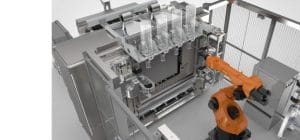Efficiency, Flexibility and the Factory of the Future with 3D Printing
The adoption of industrial 3D printing continues to grow with global spending on printers reaching nearly $11 billion in 2015. International Data Corporation (IDC) predicts that spending will rise to about $27 billion by 2019.
Statistics aside, examples of industry growth are making recent headlines. “Airbus Standardizes on Stratasys Additive Manufacturing Solutions for A350 XWB Aircraft Supply Chain,” reads the headline of an October 13th press release from leading 3D printer and materials manufacturer, Stratasys.
Andy Middleton, President of Stratasys EMEA, stated, “We see the demand for our additive manufacturing solutions coming from a variety of time-sensitive industries, including everything from aerospace and automotive to medical and consumer products. By adopting Stratasys additive manufacturing strategies in
supply chain management, companies can not only protect time to market commitments but also increase product innovation while decreasing inventory requirements.”
Additive manufacturing reportedly improves margins and productivity for manufacturers by delivering efficiency and flexibility to production supply chains. Using Stratasys technology, parts can be produced on demand at multiple locations along the production line and optimized for delivery to final assembly lines. Airbus, and industrial manufacturing companies alike, can realize cost-cutting incentives in 3D printing solutions because compared to conventional production processes less material is wasted.
Another recent announcement from Stratasys involves Schneider Electric. The global specialist in energy management and operations uses Stratasys PolyJet– and FDM-based 3D printing solutions for product development, prototypes and industrialization and in multiple applications from injection molding and assembly-line tooling to design and production. This extensive deployment of 3D printing technology is part of the company’s vision of creating the Factory of the Future to improve production efficiencies and reduce costs.
In addition to the factory of the future, Stratasys has its stakes in next-generation 3D printing. In September at the International Manufacturing Technology Show (IMTS) in Chicago, Stratasys debuted two new printers being developed in partnership with Boeing and Ford, the Infinite-Build and Robotic Composite 3D printers. The new printers will aid in making lightweight, customizable parts for the aerospace and automotive industries. You can see demonstrations in this video:
https://www.youtube.com/watch?v=u_pSEhF3q3Q
IDC’s market growth prediction describes a future that is already materializing before our eyes. From the promise of airplane wings developed by robotic 3D printing technology to other innovative production-scale applications in the Factory of the Future, innovation through additive manufacturing is here.

 Blog
Blog